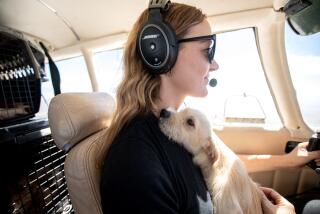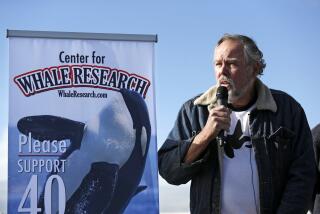Jay Holcomb, longtime leader in seabird rescue and rehab, dies at 63
- Share via
When Susan Kaveggia first met Jay Holcomb, it was in December 1998 and she had spent a long day volunteering to care for seabirds that had been caught in oil spills around Huntington Beach.
Late in the day she saw an unassuming man walking into the makeshift rescue center and called out, “Hey, where have you been all day?,” meaning to gently chide another volunteer for arriving late.
The man turned out to be the director of International Bird Rescue and by that point one of the nation’s leading authorities on rehabilitating oiled birds. It was a rare moment of anonymity for Holcomb, who began his career in 1971 and went on to lead bird rehabilitation efforts around the world.
Holcomb died June 10 in Modesto. He was 63 and the cause was kidney cancer, according to his family.
Kaveggia, who after that first meeting became a close friend of Holcomb and board chair for International Bird Rescue, said his passion for saving birds meant that he sometimes went toe-to-toe with officials or others standing in the way.
“He shot from the hip,” she said. “I always saw Jay as reasonable and open to suggestions, but when he thought he knew something and you were questioning, he would raise his hand, ‘Look, just let me do this. I have a feeling.’ I swear he was right 98.5% of the time.”
Kaveggia said Holcomb’s search-and-rescue teams that responded to the 2010 Deepwater Horizon spill in the Gulf of Mexico ran afoul of officials who did not want them collecting birds. Instead of pulling out in anger, he redeployed volunteers to concentrate on cleaning pelicans and other birds.
“Jay was insistent, he was persistent,” Kaveggia said. “A force of nature.”
Prompted to action by an oil spill in San Francisco Bay in 1971, Holcomb found his calling. That event, when two Standard Oil tankers collided under the Golden Gate Bridge, dumped more than 800,000 gallons of crude oil into the bay and resulted in the deaths of more than 10,000 birds.
At the time, there was little expertise in rescuing birds from oil slicks.
Holcomb’s experience responding to oil spills — and his resourcefulness in devising methods to clean and rehabilitate birds — built International Bird Rescue into one of the world’s preeminent wildlife organizations. The group’s team of wildlife specialists has led rescue efforts at more than 200 spills around the world.
Holcomb’s extensive experience with oiled birds led to the discovery that liquid dishwashing detergent was the most effective method to clean bird feathers. His group also crafted a volunteer-response and organization plan that is now standard among first responders.
Holcomb and his staff responded to large events such as the Exxon Valdez spill in 1989, spending six months in Alaska running three bird rehab centers and two search-and-collection programs. As many as 250,000 birds were believed to have died in that disaster. Holcomb also led the effort in 2000 to save more than 20,000 oiled African penguins caught in the Treasure Spill near Cape Town, South Africa.
When authorities became stymied about where to house so many of the small birds, Holcomb sent out teams to buy all the children’s wading pools available in local stores.
“He certainly brought a passion to bird rescue but also a series of procedures and techniques that have proven very worthwhile,” said Kimball Garrett, head of ornithology at the Los Angeles County Museum of Natural History.
Jay Burch Holcomb was born in San Francisco on April 16, 1951, and lived there until he was 9. His family then moved to San Anselmo in Marin County.
After graduating from high school, Holcomb worked at the Marin Humane Society before joining International Bird Rescue, founded in 1971 by Alice Berkner.
Holcomb is survived by his mother, Joan Finney; two sisters, Judy Craven and Marianne Groth; and a brother, Don Stauffer.
Twitter: @Julie_cart
More to Read
Start your day right
Sign up for Essential California for the L.A. Times biggest news, features and recommendations in your inbox six days a week.
You may occasionally receive promotional content from the Los Angeles Times.







